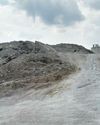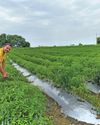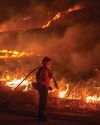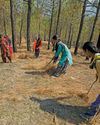
OZONE DAY SPECIAL
THE WILDFIRES that scorched much of Australia from June 2019 to March 2020 were unprecedented in scale and nature. They burned over 33 million hectares, killed or displaced 3 billion animals and caused damage to property, becoming the worst natural disaster in the country. Now scientists say that the fires have also triggered changes kilometres high in the atmosphere, widening the ozone hole.
A group of researchers in the UK have found that the intense and uncontrolled fires resulted in millions of tonnes of smoke and associated gases. "The smoke plumes formed several vortices, the largest of which maintained a coherent and isolated structure for over two months and was eventually detected at altitudes of up to 36 km," notes the study, published in Scientific Reports on August 25, 2022. The smoke plumes rose to such great heights because of black carbon, which absorbs solar heat and rises into the lower stratosphere like a hot-air balloon. The ozone layer sits in the stratosphere, located between 10 km and 50 km above Earth's surface, and absorbs harmful ultraviolet radiation from the sun. Research has linked a decrease in ozone levels to an uptick in the incidence of skin cancer and cataracts in humans.
This story is from the {{IssueName}} edition of {{MagazineName}}.
Start your 7-day Magzter GOLD free trial to access thousands of curated premium stories, and 9,000+ magazines and newspapers.
Already a subscriber ? Sign In
This story is from the {{IssueName}} edition of {{MagazineName}}.
Start your 7-day Magzter GOLD free trial to access thousands of curated premium stories, and 9,000+ magazines and newspapers.
Already a subscriber? Sign In

THE CIRCULARITY ARGUMENT
A circular economy can help India achieve its developmental aspirations while following the low-carbon pathway. It will also help address the challenges of waste management, pollution and overexploitation of natural resources. Industries are already innovating to reuse high-volume wastes and have shown that the transition can usher in both environmental and financial windfalls

Banking on flawed drug voluntary licences
The Medicines Patent Pool is pushing for more VLs, but its bad deal with Novartis on a cancer drug shows the pitfalls

Lasting solutions
For the first time, the UN has recognised the role of indigenous communities in tackling aridity. A repository of traditional knowledge India has the wherewithal to lead the way

IMD at 150
India's journey into modern weather forecasting took a decisive turn 150 years ago with the establishment of India Meteorological Department during the British rule. The agency has come a long way since then, shaping the way the country predicts and responds to its diverse climate challenges

Every drop counts
In drought-prone Marathwada region, 14 villages have managed to counter water shortage by budgeting the resource

Threat to survival
Hollongapar Gibbon Sanctuary in Assam faces ecological challenges as railway electrification and hydrocarbon exploration endanger its fragile biodiversity

'Migration is going to be a battlefield'
AMITAV GHOSH is one of the foremost chroniclers of our times. His literary sojourn includes writings on topics that range from languages to climate change to human lives. His latest book, Wild Fictions, brings some of his works on these issues under one title. In a conversation with RAJAT GHAI, Ghosh shares his views on the future of human movement. Excerpts:

Face of future
California wildfires confirm forest fires are intensifying in a hotter world, emitting substantial amounts of greenhouse gases and reinforcing global warming

Friends of the forest
Residents of 30 villages in Uttarakhand establish a model for public participation in saving forests from wildfires

Climate-crazy playbook
Just hours after his second (and final) term began on January 20, US President Donald Trump unleashed 46 presidential actions. Several of these are centred on the US' climate commitments, energy transition, migration and trade policies, and are likely to have negative global implications